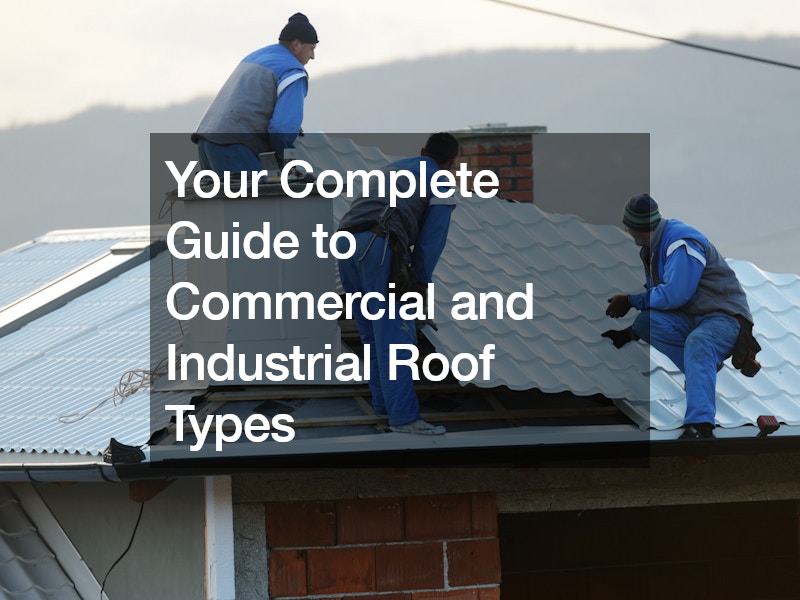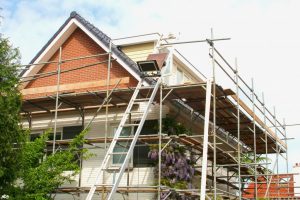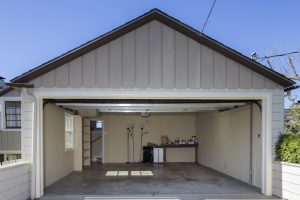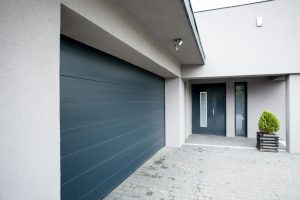Investing in roofing is a major decision that shouldn’t be made lightly. Whether you’re the owner of a commercial building or you invest in commercial and industrial properties, you’ll need to know as much as possible about both commercial and industrial roof types before investing in a new roof replacement or conducting repairs. The more well-versed you are regarding industrial and commercial roof types, the easier it’ll be for you to stay on budget each time one of your roofs requires an inspection, repair, or even a complete replacement.
Comparing Roof Types
Whether you’re in the market for corrugated roofing or you want to learn more about flat roofs, it’s important to distinguish between both commercial and industrial roof types before you make any finalized decision. Commercial roofs typically consist of flat roofs, metal solutions, single-ply membrane roofing, BUR (Built-Up Roofing), green roofing, and cool roofing solutions. On the other hand, industrial roof types range from flat and metal roofs to modified Bitumen roofing, fiberglass roofs, sloped roofs, asphalt roofs, and even modernized solar installations.
Commercial Roof Types
Before you begin searching for local commercial roofers or even independent roofing contractors, familiarizing yourself with the leading commercial roof types and materials can help in the decision-making process. Flat roofs are some of the most common types of commercial roof solutions available on the market today and are optimal for commercial spaces designed for retail and offices alike. They are cost-effective and can also be easily integrated with modern solar panels in the future.
Metal roofing is one of the most durable commercial materials to consider for longevity and flexibility. Single-ply membrane roofing is typically used on larger buildings, such as restaurants and even shopping malls. With single-ply membrane roofing, solutions such as PVC and TPO are used for UV protection along with energy-efficient benefits.
BUR, or Built-Up Roofing is another solution ideal for retail stores and warehouses close to the ground. BUR roofs are optimal for those who are interested in insulation solutions in addition to solid waterproofing options. Green roofing is ideal for anyone who is interested in investing in eco-friendly roofing for their commercial office or retail space. Commercial roofs are also ideal for locations that are prone to extremely hot weather or heatwaves.

Industrial Roofing Materials and Types
In addition to traditional commercial roofing materials, there are also industrial roofing solutions to consider. Before searching for a local roofer or a commercial roofing expert, you’ll want to know your industrial roofing options ahead of time to feel informed and knowledgeable when the time comes. Industrial roofing is typically utilized in larger buildings, such as stadiums, warehouses, and even schools, depending on the size and the roof needs.
Common industrial roof types also include both flat and metal roofs, which are also often used in traditional commercial environments. Modified Bitumen roofing is also used in industrial settings, which can offer digital protection from chemical exposure and other potentially toxic atmospheres. A sloped roof may also be intricately designed with a custom shape to suit a building’s specific needs, preventing standing water from accumulating or causing damage to the roof and the building’s interior itself.
Additionally, there is also fiberglass roofing, which is optimal for storage centers and even oversize warehouses, depending on your location. Fiberglass roofing is extremely lightweight, making it appealing for those who have a large roof to cover. If you’re seeking a roof material that can protect your roof from stress and even environmental hazards in some cases, you may want to learn more about all that fiberglass roofing has to offer before you make a decision about your own industrial roof’s needs.
Some traditional solutions can also be applied as an industrial roof, including both asphalt shingles and solar roofing panels and systems. Asphalt roofs are extremely economical, versatile, and flexible in terms of materials, colors, and application. Solar roofing can also be ideal for industrial locations if your goal is to reduce energy waste while generating renewable energy without placing additional strain on your local power grid.
Choosing the Right Roofing Material
Choosing the right roofing material will greatly depend on the purpose, location, size, and height of your building. You’ll also need to consider what type of climate your business is located in to find a roofing material that is likely to last the longest without issues or long-term damage. Researching individual commercial and industrial roofing is always recommended whether you’re in need of re-roofing services, tile roof repairs, or if you’re ready to take the leap and invest in a brand-new commercial or industrial roof altogether.

Pros and Cons of Commercial and Industrial Roof Types
Before you settle on a decision that’s ideal for your property’s roof, take a bit of time to compare the pros and cons of each. The more familiar you are with the differences between industrial and commercial roofs, the easier it’ll be for you to finalize your selection knowing you’re making the right decision.
Flat Roof
A flat roof is extremely common for both traditional commercial roof properties and large industrial locations. Flat roofs are extremely affordable, and the installation process is typically much easier than alternative materials.
Pros of a Flat Roof:
- Flat roofs are affordable and one of the most economical choices you can make.
- Flat roofs are extremely accessible, which can make inspections and repairs a breeze.
- With a flat roof, there is more room for additional utilities, such as solar panels or add-on HVAC units, depending on your household’s needs.
Cons of a Flat Roof:
- You may find limits when it comes to developing a sloped roof with flat roof materials.
- Flat roofs are more likely to allow water to pool due to their lack of slope.
- Extreme weather may be more damaging to flat roofs, depending on your location and the climate you’re in.
Pros of Metal Roofing:
- Metal roofing is a long-term investment, as some metal roofs have the ability to last more than 50 years when properly installed and with proper routine maintenance.
- Metal roofing is known to deter pest infestations while also acting as a detterrant to typical water rot and damage from fire.
- Metal roofing is extremely strong and durable without being overly heavy to carry or work with, especially during the installation process.
Cons of Metal Roofing:
- Metal roofing is much more susceptible to damage from falling hail or surrounding objects, which can cause permanent damage to the roof without much recourse.
- Contraction and expansion may occur more frequently with a metal roof installed, especially if you’re located in an area with all four seasons. This can cause a noisy roof.
- Metal roofs are known for being a bit more expensive than traditional roofing materials, such as asphalt and even concrete solutions. Initial costs may make metal roofing out-of-reach for most individuals who may have a stricter budget in place.
Pros of Single-Ply Membrane Roofing:
- Using PVC, EPDM, and TPO materials are extremely flexible and versatile, allowing them to be applied in numerous working environments without hassle.
- Single-ply membrane roofing is also ideal for those who are interested in an energy-efficient roof that doubles with UV-resistant material intact.
- Single-ply membrane roofing is extremely attractive to homeowners who are interested in material that requires very low maintenance for long-term benefits and results.
Cons of Single-Ply Membrane Roofing:
- Unfortunately, single-ply membrane roofing is not indestructible, and may deteriorate over time without proper inspections, maintenance, or repairs as necessary. When damage occurs to a single-ply membrane roof, it’s much more likely to experience serious leaks in the home.
- While single-ply membrane roofing is attractive due to its affordable and versatile materials, it’s important to note that it’s also extremely vulnerable to sharp objects, including tree branches and outdoor debris. If you live in a location where you’re prone to heavy winds and harsh storms, a single-ply membrane roofing solution might not be the top pick for your commercial or industrial building.
- Reduced lifespan: If you install a single-ply membrane roof onto an industrial or commercial building that’s subjected to harsh winds, temperatures, and natural disasters, there’s no guarantee the roof will last without substantial damage. Both chemical exposure and extreme temperatures can have devastating effects on single-ply membrane roofing, regardless of the location of the roof and the building itself.
Pros of Built-Up Roofing (BUR)
- Because BUR uses multiple layers of fabrics and asphalt, it’s ideal for those who are interested in a highly insulated and waterproofed roof, regardless of the size of building that’s being renovated.
- BUR is also ideal for locations that require the ability to accommodate heavy foot traffic.
- Additionally, BUR roofing solutions can be extremely beneficial for environments that are constantly exposed to harmful UV rays or even surrounding chemicals in the air.
Cons of BUR Roofing Solutions
- Unfortunately, BUR roofing is much heavier than standard alternative roofing materials, which may ultimately require additional support before you can get started with a roofing installation job.
- Installing a BUR roof requires an entire crew, can be labor-intensive, and can take much longer than when installing a traditional commercial or industrial roof.
- BUR roofs require constant inspections and routine maintenance to prevent material cracks and blistering over time.
Pros of Asphalt Roofing
- Asphalt roofing is extremely versatile and can be applied in residential, commercial, and industrial environments.
- Asphalt roofing is some of the most affordable and cost-effective materials to invest in, with many different options and colors to choose from.
- Weather resistance and waterproofing are also possible with asphalt roofing solutions with ongoing inspections and routine maintenance.
Cons of Asphalt Roofing Materials:
- Using asphalt roofing materials may leave your building much more susceptible to various temperature fluctuations along with harmful UV rays, depending on your location.
- The quality of the installation job that involves asphalt materials, especially when it comes to the overall longevity of your roof.
- An asphalt roof will not likely last as long as a metal, sheet, or even a concrete or flat roof designed specifically for industrial and commercial buildings.

Pros of Solar Roofing Panels and Solutions:
- Investing in solar panels can help you reduce the strain you place on the power grid while simultaneously reducing your household’s carbon footprint.
- In many instances, there are savings and incentives available for homeowners who are interested in transitioning to the use of solar panels.
Cons of Solar Panels:
- Unfortunately, solar panels aren’t always reliable and may be dependent on the outside weather. A significant hailstorm can have a major impact on an entire solar farm.
- Specialized maintenance and inspections may be required for upkeep.

Working With a Professional Roofing Crew
Even once you’ve settled on the type of roofing material you’ll be using for your industrial or commercial property, you’ll also want to begin seeking the right local roofing company near you who can help take on the task. Hiring a commercial roofing business is always recommended when you’re updating an industrial or commercial roof. The more experienced a commercial roofer is, the less likely you are to encounter issues with zoning, regulations, or laws as you add a new roof or use new material on any of your properties and structures.
Professional commercial roofers aren’t just experienced with different commercial and industrial roof types, but they’re also well-versed in specific requirements necessary to get started on the construction or repairs you have in mind. When you’re working with a reputable professional roofing crew, you can do so while also resting assured once you’ve verified their presented licensing, insurance, and certification. A licensed and insured roofer will protect you from potential liabilities should anything go wrong during construction, such as an accident or fall.
Whether your commercial space requires a vented roof system or you’re seeking tile roof repairs, you’ll need to know what type of roofing assistance you need to restore your roof to its natural and original condition. The more familiar you are with the differences between commercial and industrial roofs, the easier it’ll be for you to navigate the process of picking the right materials and solutions for your roof’s needs. If you’re the owner of a commercial storefront, or you manage numerous industrial plants, you’ll need to know exactly what type of roofing material to use anytime you’re in need of an inspection, repair, or complete replacement.






